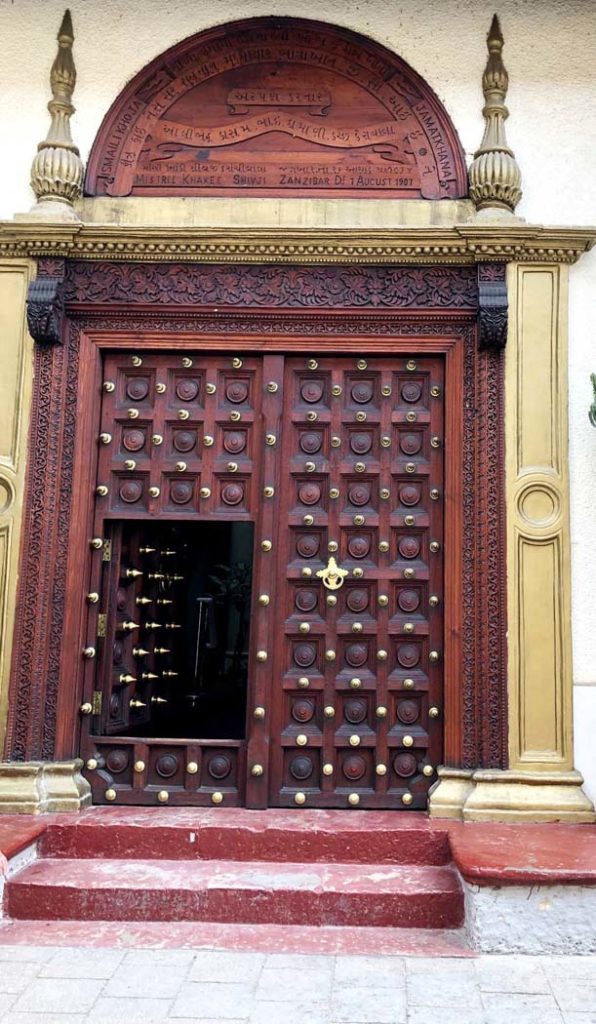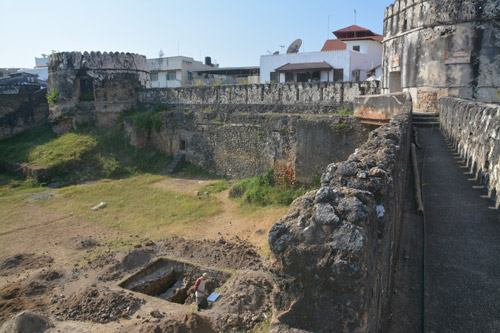Stone Town, Zanzibar: A Journey Through Time

Introduction to Stone Town, Zanzibar
Welcome to Stone Town, a fascinating historic city on Zanzibar's beautiful island. Stone Town is Zanzibar's cultural and historical heart and is known for its vibrant atmosphere and unique architecture. As you wander through its narrow streets and alleyways, you'll be transported back in time and immersed in the rich history of this enchanting place.
Historical significance of Stone Town
Stone Town has deep historical significance and was once a thriving centre of trade and commerce in the region. It was an important hub for traders from Arab, Persian, Indian, and African countries, who brought with them their own cultures and traditions, which can still be seen in the city today.
One of the remarkable features of Stone Town is its architecture, which blends African, Arab, European, and Indian influences. The buildings are made of coral stone, giving the city its distinct appearance. Wander through the maze-like streets and discover the intricately carved wooden doors, balconies, and verandas that adorn many buildings.
Stone Town also holds great historical importance as it played a significant role in abolishing the East African slave trade. The Slave Market and the Anglican Cathedral, built on the site of the former slave market, serve as reminders of this dark period in history.
In recent years, Stone Town has become a popular tourist destination, attracting visitors from all over the world. Its vibrant markets, spice tours, and cultural experiences make it an ideal place for those seeking to learn about Zanzibari heritage and immerse themselves in the local way of life.
Whether you're exploring the winding streets, touring the historical sites, or taking in the stunning views of the Indian Ocean, Stone Town is sure to captivate and inspire you with its unique charm and rich history. So, come and experience the magic of Stone Town for yourself!

Exploring Stone Town
Architectural features of Stone Town
As you continue your exploration of Stone Town, you'll be amazed by its unique architectural features that showcase a blend of African, Arab, European, and Indian influences. The buildings, constructed from coral stone, exude a distinct charm that adds to the city's allure. Take a moment to appreciate the intricately carved wooden doors, balconies, and verandas that adorn many structures. Each piece of architecture tells a story and reveals the rich heritage of Stone Town.
Must-see attractions in Stone Town
In addition to its architectural beauty, Stone Town boasts several must-see attractions that offer insights into its history and culture. Here are a few highlights to add to your itinerary:
-
The Slave Market: Step back in time and visit the historical site of the Slave Market. Explore the museum located within the Anglican Cathedral, which sheds light on the dark period of the East African slave trade. It's a poignant reminder of the resilience and strength of the Zanzibari people.
-
Forodhani Gardens: Located along the waterfront, Forodhani Gardens is a lively gathering place in the evenings. Indulge in delicious street food from the local night market and enjoy the lively atmosphere as street performers entertain visitors. It's the perfect spot to relax and soak up the vibrant energy of Stone Town.
-
Spice Tours: Embark on a sensory adventure and take a spice tour in Stone Town. Visit the nearby spice farms and learn about the history and cultivation of various spices, such as cloves, cinnamon, and vanilla. Engage your senses as you smell, taste, and touch the aromatic spices that have shaped Zanzibar's economy and cuisine.
-
House of Wonders: Don't miss visiting the House of Wonders, a prominent landmark in Stone Town. This impressive building once served as the Sultan's palace and is now a museum that showcases Zanzibar's cultural heritage. Explore the exhibits that delve into the island's history, art, and traditions.
Exploring Stone Town is a journey through time and culture. From its architectural marvels to its fascinating attractions, this historic city offers a captivating experience. So, please put on your walking shoes, immerse yourself in the vibrant atmosphere, and let Stone Town enchant you with its rich history and undeniable charm.

Colonial Influences in Stone Town
Impact of Portuguese Colonization on Stone Town
During the 16th century, Stone Town fell under Portuguese rule, which significantly impacted its development and cultural influences. The Portuguese established a trading post and fort, bringing their architectural styles and influences. The oldest fort is the most prominent example of Portuguese influence, a massive stone structure that still stands today. It served as a stronghold and defensive fortification during that era.
Influence of Omani rule on Stone Town
Stone Town later came under the rule of the Omani Sultanate in the 18th century, leaving a lasting impact on its architecture and cultural landscape. Omani rulers brought unique architectural designs characterized by intricately carved doors and balconies, showcasing the city's rich Arab heritage. The Arab influence is particularly evident in construction of prominent buildings like the House of Wonders and prominent mosques in Stone Town.
The colonial influences of both the Portuguese and Omani rule have left indelible marks on Stone Town's architectural identity. The blend of African, Arab, European, and Indian styles reflects the city's rich and diverse history. As you stroll through Stone Town's narrow alleyways, please take a moment to admire the unique architectural features and buildings that stand as testaments to its colonial past.
Whether you're interested in exploring Stone Town's architectural wonders or immersing yourself in its vibrant culture, this historical city has something to offer for everyone. So, include Stone Town in your travel itinerary and get ready to be captivated by its distinctive charm and fascinating history.

Cultural Heritage of Stone Town
The cultural diversity of Stone Town
One of the most remarkable aspects of Stone Town is its cultural diversity. As you wander the streets, you'll encounter a melting pot of different cultures and traditions. Stone Town has been shaped by the influences of the African, Arab, European, and Indian communities that have called it home over the centuries. This vibrant mix of cultures is evident in its architecture, cuisine, music, and language.
The African heritage is deeply rooted in Stone Town's culture, with Swahili being the dominant language spoken in the city. The Arab influence, brought by Omani rulers, is reflected in the city's Islamic architecture and the call to prayer echoing from the mosques. The European influence can be seen in the colonial buildings and remnants of British and German rule. The Indian influence is evident in the spice markets and flavours that permeate Stone Town's cuisine.
Traditional crafts and markets in Stone Town
Exploring Stone Town's traditional crafts and markets is a must-do for any visitor. The city is known for its skilled artisans who create beautiful handicrafts, such as intricately carved wooden furniture, textiles, and jewellery. The best place to witness these crafts is at the Zanzibar Curio Shop, where you can find many unique souvenirs to take home.
The markets of Stone Town are a feast for the senses. The Darajani Market is a bustling hub of activity, selling everything from fresh produce to spices, fabrics, and local delicacies. The Forodhani Night Market is a must-visit in the evenings, where you can indulge in delicious street food while enjoying the lively atmosphere.
As you explore the traditional crafts and markets of Stone Town, you'll not only get to immerse yourself in the vibrant culture but also support the local artisans and traders who keep these traditions alive.
So, add a visit to Stone Town's cultural sites, crafts, and markets to your itinerary and experience the rich heritage and traditions that make this city unique.
Spice Tours in Stone Town
Importance of spice trade in Stone Town
When it comes to spices, Stone Town is a treasure trove. The city's proximity to the spice farms of Zanzibar has made it a hub for the spice trade. Zanzibar has been known as the "Spice Island" for centuries and has played a significant role in the global spice trade.
The importance of spices in Stone Town's history and culture cannot be overstated. These aromatic ingredients have not only shaped the cuisine of the region but have also contributed to its economic prosperity. From cloves and cinnamon to cardamom and nutmeg, the abundance of spices in Stone Town has attracted traders worldwide.
Exploring the spice markets of Stone Town is a delight for the senses. The vibrant colours, enticing aromas, and bustling atmosphere create an unforgettable experience. Walking through the narrow streets, you'll come across stalls overflowing with sacks of spices, each with its distinct scent and flavour.
Exploring spice farms in Stone Town
If you want to delve deeper into the world of spices, visiting one of the spice farms in Stone Town is a must. These farms offer an immersive experience where you can learn about various spices' cultivation, harvesting, and processing.
During a spice tour, you can touch, smell, and taste various spices and herbs. Knowledgeable guides will educate you on each spice's different uses and medicinal properties. You might be surprised to learn about the healing properties of turmeric or the digestive benefits of ginger.
Some spice farms also offer cooking classes, allowing you to learn traditional recipes and techniques using freshly harvested spices. Imagine recreating the flavours of Stone Town's cuisine in your kitchen!
In addition to spices, these farms cultivate tropical fruits like mangoes, papayas, and bananas. Exploring the lush greenery, you'll witness the synergy between spice cultivation and fruit farming.
A spice tour in Stone Town is an educational experience and a way to support the local farmers who rely on the spice trade. So, don't miss the chance to embark on a sensory adventure and discover the secrets of Stone Town's spices.
Stone Town's Food Scene
Traditional Swahili cuisine in Stone Town
When it comes to food, Stone Town offers a culinary adventure that will tantalize your taste buds. The city is known for its vibrant and flavorful Swahili cuisine, a fusion of African, Arabic, Indian, and European culinary traditions.
Traditional Swahili dishes reflect the region's rich history and cultural diversity. One popular dish is Biriyani, a fragrant rice dish cooked with spices, meat, or vegetables. Another must-try is Zanzibar Mix, a street food delicacy of fried cassava, plantains, and lentil patties.
One cannot talk about Swahili cuisine without mentioning the famous Zanzibar pizza. This unique culinary creation is a crispy, savoury stuffed pancake filled with minced meat, vegetables, and cheese. It is a delicious snack that is sure to satisfy your cravings.
Seafood delicacies in Stone Town
Stone Town is an island destination renowned for its delectable seafood dishes. Fresh fish, prawns, lobsters, and calamari abound and are expertly prepared using local spices and flavours.
For seafood lovers, a visit to the Forodhani Night Market is a must. This vibrant outdoor market comes alive in the evening, offering grilled fish, seafood skewers, and Zanzibar's famous seafood soup, Urojo. It's the perfect place to indulge in the tantalizing flavours of the ocean.
Suppose you prefer a more upscale dining experience. In that case, Stone Town is home to several elegant seafood restaurants that offer a variety of dishes ranging from grilled octopus to coconut fish curry. These establishments provide a wonderful ambience in which to enjoy a romantic dinner with breathtaking views of the Indian Ocean.
Whether you're a fan of traditional Swahili cuisine or a seafood enthusiast, Stone Town's food scene has something for everyone. So, explore the local eateries, street food stalls, and restaurants to discover the delicious flavours that make this city a gastronomic delight.
Living History in Stone Town
Historic buildings and landmarks in Stone Town
Stone Town is a treasure trove of historic buildings and landmarks, showcasing its rich history and cultural heritage. As you wander through its narrow streets and alleys, you'll come across beautifully preserved structures that transport you back in time.
One iconic landmark is the House of Wonders, also known as Beit-al-Ajaib. This impressive building was the first in Stone Town to have electricity and an elevator, making it a wonder during its time. Today, it houses a museum that displays artefacts and exhibits that give insights into Zanzibar's history and culture.
The historic Old Fort, also known as Ngome Kongwe, is another must-visit attraction. Built-in the late 17th century, this fort was a defensive structure and a prison. Today, it is a cultural centre hosting events, exhibitions, and performances.
Another noteworthy site is the Old Dispensary, a beautifully ornate building that was once a dispensary and is now home to souvenir shops and a cultural centre. Its intricate architecture and decorative details make it a photographer's dream.
Preserving the heritage of Stone Town
The rich heritage and architectural beauty of Stone Town are actively being preserved and protected. The city has been designated as a UNESCO World Heritage Site, highlighting its historical and cultural significance.
Efforts are being made to restore and maintain the historic buildings, ensuring that future generations can continue to appreciate the unique charm of Stone Town. Many buildings have been converted into boutique hotels, museums, and cultural centres, breathing new life into them while still honouring their past.
Local organizations and initiatives also play a vital role in preserving the heritage of Stone Town. They work to raise awareness, promote sustainable tourism, and engage the community in efforts to safeguard the city's cultural identity.
By exploring Stone Town's historic buildings and landmarks, you get a glimpse into its captivating past and contribute to preserving its heritage. So, take your time to immerse yourself in the living history of this enchanting destination.

Beaches and Nature in Stone Town
Beach activities in Stone Town
Stone Town is not just about its historic buildings and landmarks; it also offers a range of beach activities that will keep you entertained and relaxed. Whether you're looking to soak up the sun or engage in water sports, there's something for everyone.
The beaches in Stone Town are known for their picturesque beauty and clear turquoise waters. You can spend your days lounging on the soft white sand, taking in the breathtaking views of the Indian Ocean. If you're feeling more adventurous, you can try snorkelling or diving to explore the vibrant coral reefs and marine life.
One of the popular beaches in Stone Town is Forodhani Beach, which is located near the Forodhani Gardens. This beach offers a lively atmosphere with street vendors selling delicious local food, making it a perfect spot for a picnic or a sunset stroll.
Exploring nearby natural attractions
In addition to its beaches, Stone Town is surrounded by natural attractions worth exploring. Just a short distance away, you'll find lush forests, spice plantations, and picturesque waterfalls.
Jozani Chwaka Bay National Park is a must-visit for nature lovers. This park is home to the rare and endemic Zanzibar red colobus monkeys and various bird species. Take a guided tour and venture into the dense mangrove forests, where you'll have the opportunity to spot these unique creatures in their natural habitat.
If you're interested in learning about the spices that Zanzibar is famous for, visiting one of the spice plantations is a must. Take a guided tour and learn about the cultivation and uses of various spices like cloves, cinnamon, and nutmeg. You may even get a chance to sample some freshly prepared spice-infused dishes.
To cool off on a hot day, head to the Marahubi Palace Ruins. These ruins were once the summer palace of Sultan Barghash and provide a tranquil escape from the bustling streets of Stone Town. Explore the intricately carved ruins and enjoy the serene surroundings.
Stone Town has something to offer whether you're a beach lover or a nature enthusiast. Plan your trip to this enchanting destination and discover the beauty of its beaches and nearby natural attractions.

Tips for visiting Stone Town
When visiting the beaches of Stone Town:
- Bring sunscreen, a hat, and a beach towel for maximum comfort under the sun.
- Consider renting equipment from one of the local dive shops to enjoy the underwater beauty of the coral reefs.
- Try the street food at Forodhani Beach for a unique cultural experience. Indulge in traditional dishes like Zanzibar pizza and spiced grilled seafood.
- Consider hiring a local guide to appreciate the natural attractions surrounding Stone Town fully. They can provide valuable insights and navigate the area.
When visiting Jozani Chwaka Bay National Park:
- Wear comfortable shoes.
- Bring insect repellent to ensure a pleasant and hassle-free walk through the mangrove forests.
In the spice plantations:
- Don't be afraid to ask questions and engage with the guides to learn more about the spices and their cultural significance.
Respect the historical significance of the Marahubi Palace Ruins by refraining from touching or removing any artefacts or vegetation from the site.
Take some time to explore the narrow streets of Stone Town itself, as it is a UNESCO World Heritage Site with a rich history and fascinating architecture.
